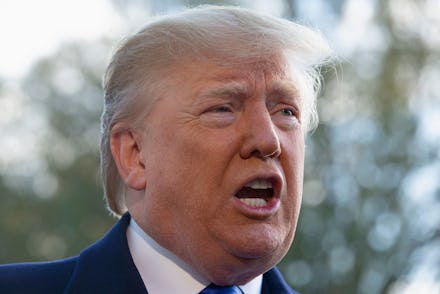Trump reverses longtime U.S. policy by saying Israel's West Bank settlements aren't illegal

Since President Trump came into office, the administration has taken a clear pro-Israel stance. From controversially recognizing Jerusalem as Israel's capital to cutting aid intended for Palestinian refugees, Trump hasn't shied away from the volatile region. On Monday, Secretary of State Mike Pompeo furthered that agenda, announcing that Israeli settlements in the West Bank will no longer be considered illegal.
Pompeo's move cancels a long-held memorandum that was put into place by the Carter administration. In 1978, the State Department issued a memo stating that Israeli settlements on the occupied Palestinian land in the West Bank were "inconsistent with international law."
Not every president has been in favor of that position, though. As noted by Vox, President Ronald Reagan — who took office after President Jimmy Carter — disagreed with it. However, the Trump administration is the first to formally reverse the Carter-era rule.
The decision received immediate criticism from Palestinians and U.S. politicians alike, including Minnesota Rep. Ilhan Omar and 2020 presidential candidate Bernie Sanders, the Vermont senator.
"Israeli settlements violate [international] law, decades of U.S. foreign policy, and the human rights of Palestinians," Omar tweeted. "All who believe in the possibility of peace must speak up in this moment."
In addition to overturning the Carter administration's memo, the new position rejects a 2016 United Nations Security Council resolution. At that time, the council reaffirmed that settlements on the West Bank are a "flagrant violation" of international law with no legal validity. Sanders referenced this decision in his own tweet on the matter.
"Israeli settlements in occupied territory are illegal. This is clear from international law and multiple United Nations resolutions," Sanders wrote. "Once again, Mr. Trump is isolating the United States and undermining diplomacy by pandering to his extremist base."
While Pompeo's announcement by itself doesn't change any policy, it's a clear signal that the Trump administration has no plans to take meaningful action against the genocide and human rights violations Palestinians face daily. Jordanian Foreign Minister Ayman Safadi said the U.S.'s decision would have "dangerous consequences" for the Middle East peace process, per Al Jazeera, while one humanitarian group leader said the move was "another gift" to embattled Israeli leader Benjamin Netanyahu.
Still, the Trump administration maintains that the softened stance is better for the more than 600,000 Israelis living in settlements among roughly 3 million Palestinians in the occupied territory. “Calling the establishment of civilian settlements inconsistent with international law has not advanced the cause of peace,” Pompeo said. “The hard truth is that there will never be a judicial resolution to the conflict, and arguments about who is right and who is wrong as a matter of international law will not bring peace.”